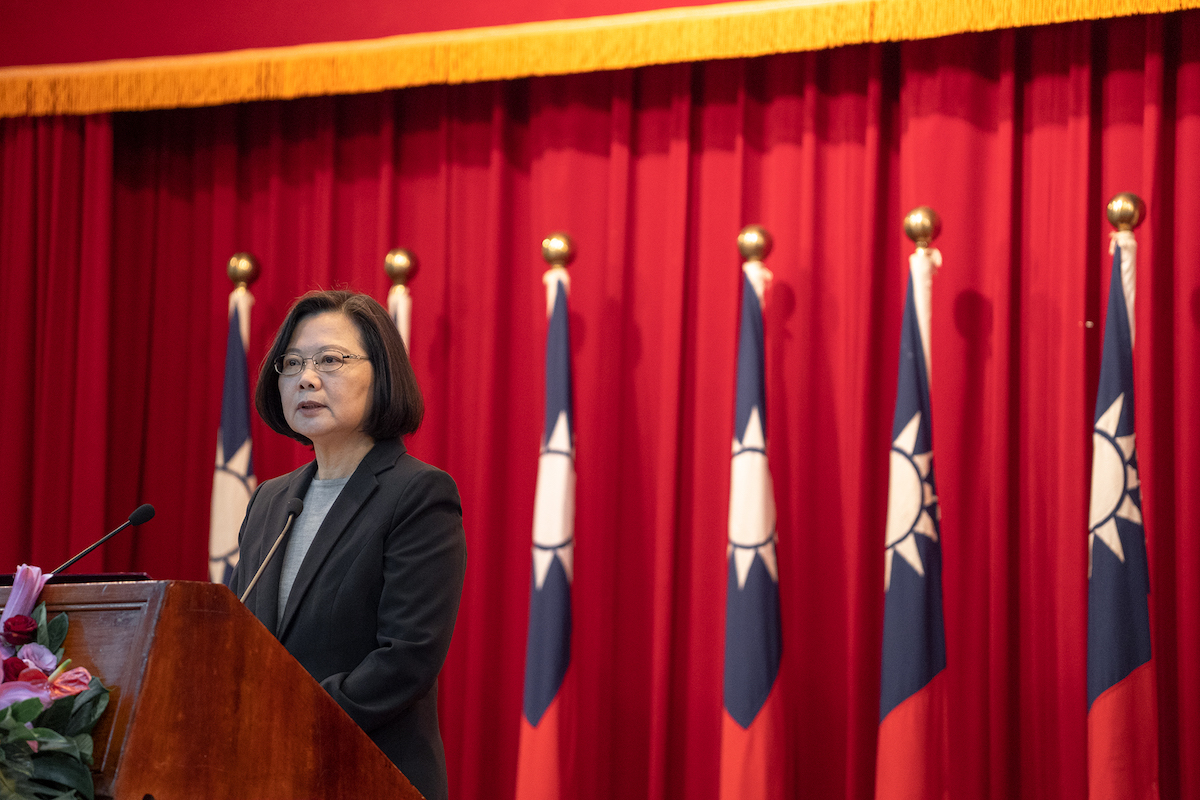Taiwan’s Democratic Progressive Party (DPP) lost November’s elections in a landslide due to President Tsai Ing-wen’s failure to control her own party. The defeat was followed by questions about who will lead the DPP into the presidential elections in 2020.
After electoral losses and a leadership struggle, disciplining the DPP remains as crucial for Tsai now as it was before November’s elections. Her electoral strategy was based on a reasonably accurate assessment of the fault-lines that have been developing both within Taiwan and the DPP.

While in Australian or British politics the left-wing is “red” and the right-wing is “blue”, the distinction in Taiwan is between the “green” DPP that generally supports Taiwan independence and the “blue” Kuomintang (KMT) that tends to promote reunification with China. The DPP has also supported progressive issues such as gay marriage, while the KMT has conversely adopted more conservative policies of late.
Within Taiwan’s “green” DPP, there are three factions that have been hardening under the leadership of Tsai Ing-wen.
First are the deep-greens. This faction consists of an eclectic mix of young and old supporters of Taiwanese independence. The young cut their teeth during the 2014 Sunflower Movement against then KMT president Ma Ying-jeou’s overtures to Beijing, while the old were born while the party was still an underground movement opposing KMT dictatorship. Both share a hatred of the KMT, a resolute desire for Taiwan independence and a deep suspicion of people who appear to sympathise with re-unification or the KMT.
Next are the southern Taiwanese. This is a group of people who feel as though Kuomintang had neglected southern cities like Kaohsiung. Southern Taiwan floundered economically under the Kuomintang while the northern cities like Taipei prospered. While southern Taiwanese are generally supportive of independence, it’s the economic issues that matter most.
Finally are the pan-greens. Generally speaking, the pan-greens are a loose coalition who tend to support moderate, progressive candidates like President Tsai Ing-wen or Mayor of Taipei Ko Wen-je.
Tsai Ing-wen’s presidential campaign was successful because she used her charisma to create a bridge between each of these three factions in the DPP. Tsai may have known this when her approval ratings fell in mid-2017. However, instead of playing to her strengths with the public, Tsai developed an inward-looking strategy to maintain discipline within the DPP.
For the DPP, the lesson from November’s elections could have been to realise that party is a broad church and ought to support a more cautious brand of progressive politics.
The strategy was simple. Promote the deep-greens’ poster boy, William Lai, to premier and temporarily contain their desire for Taiwanese independence; promote Chen Chu to Secretary-General of the Presidential Office and make the southern Taiwanese feel as though Tsai cares about them, and; maintain close ties with Mayor of Taipei Ko Wen-je in order to keep moderate voters within the DPP camp.
Tsai’s strategy to quell DPP factionalism began unravelling in the months leading up to November’s nine-in-one elections.
In April, William Lai began brandishing his deep-green credentials by labelling himself a “Taiwan independence worker” in the Executive Yuan. This worked to embolden the deep-greens and undercut Tsai’s cross-strait policy.
In May, Tsai promoted Chen Chu to lead the presidential office. Rather than making southern Taiwanese feel needed, Tsai simply took away Kaohsiung’s favourite mayor. Finding a suitable replacement for Chen proved difficult for southern Taiwanese members of the DPP.
In August, the DPP fielded the deep-green candidate Pasuya Yao for the historically KMT seat of Taipei instead of backing the largely pro-DPP, independent Ko Wen-je. Support from the pan-greens then came into question.
Tsai failed to control the DPP and the DPP seemed unwilling to be controlled. The Taiwanese people then punished Tsai’s DPP at the ballot box in November’s nine-in-one elections.
A referendum on using the name “Taiwan” at sporting events failed, which appeared to rebuke the deep-greens. The DPP lost Kaohsiung which could be viewed as the result of poor campaigning from southern Taiwanese members. Deep-green Pasuya Yao lost not only to Ko Wen-je but also to the KMT’s self-described “boring, but useful” Ting Shou-chung, demonstrating that the pan-greens are better aligned with Ko’s more moderate views. Tsai later accepted responsibility for these defeats by resigning as DPP chair.
For the DPP, the lesson from November’s elections could have been to realise that party is a broad church and ought to support a more cautious brand of progressive politics. Indeed, that was precisely how Tsai Ing-wen led the DPP to victory during 2016’s presidential election.
Instead, the DPP rumour mill continued throughout December. The deep-greens authored a letter asking Tsai not to run in 2020’s presidential election. Meanwhile, Tsai’s premier William Lai did little to quell rumours that he would run for president in 2020.
Tsai held firm. One of her staunch allies, Cho Jung-tai, was elected party chair on Sunday afternoon. This led some to suggest that Tsai managed to “quash” a rebellion led by the deep-greens, pointing to Cho winning 72.6% support for his chairmanship. Turnout, however, was at an extremely low 16.9% of eligible voters. This indicates that Tsai’s position within the DPP remains intact, yet precarious.
Tsai not only must repair the DPP after a brutal defeat in November but now she will need to heal the wounds of December’s leadership struggle. Disciplining Taiwan’s pro-independence political party could hardly get more important or, indeed, difficult.

